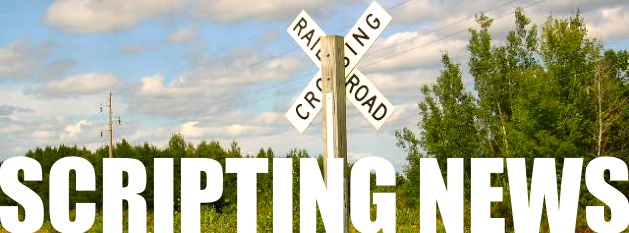
|
|||||||||||||||||||||||||||||||||||||||||||||||||||||||
Can you come up with a creative caption for this picture? Wired: How France is saving civilization. Amen. Jon Udell explores Amazon's S3 network storage system. And Matt Croydon is backing up his Flickr pics to S3. People ask why. Because it's interop. It's a blade of grass popping through the ground, certain to be followed by many more. The next blades will be more useful. David Berlind expands on the possible connection between OPML and wikis. Phil Jones found an XML-RPC interface for a wiki, not the MetaWeblog API, though. Steve Rubel notes that the Kremlin supports RSS. Sometimes, rarely, Valleywag has me in stitches.
News.com: Who Microsoft invites to a "conversation" Three years ago today: "Microsoft doesn't really exist to give customers what they want, the harsh truth is that they exist to keep employing more Microsoft people." Thoughts from Sunday's CyberSalon I'm having lunch today with Sylvia to talk about Sunday's CyberSalon. Here are some of my notes. I sat in the front row, an unusual place for me to sit, but it allowed me to pass a note to John Markoff, technology reporter for the NY Times, who was one of the panelists. My note said "It doesn't have to be adversarial." He wrote a response, which wasn't public, so I won't include it here, but a productive discussion followed, and a handshake, and we're having lunch next week in San Francisco. If I had a chance to rewrite the note, I might have said -- It mustn't be adversarial, between us, because we already have a mutual adversary, the Executive Branch of the U.S. government, who would, if they could, completely disempower the press, and control the flow of information to the populace. Anyone who's paying attention in 2006 needs to be concerned about this. I think our concern has morphed to ambivalence, because we all feel so powerless to do anything about it. But what if we combined resources, saw ourselves as part of the same effort, with the same goal, to improve the flow of information to the citizens, to counter the negative efforts of the government. I have a sneaky feeling that money would start flowing again, while our attention was focused on our mission, and if we looked at each other, pro and amateur, less like adversaries, and more like allies.
We're not going to get anywhere by calling each other wrong, there's been finger-pointing both ways, and I've done it myself at times, and I've got to remind myself that it's not constructive. The pros have often erred by being dismissive of the bloggers, but maybe we're getting past that. They now tend to see the problem as economic -- that Craig's List is eating into their revenue. But there's a balancing opportunity. Some, perhaps not many, of the people reading Craig's List, share the passion for informaiton and democracy that a good idealistic reporter does, and will do it for love, not money. I believe the vast amount of editorial writing will be done for no money. This isn't really new, after all, the publications don't pay their sources -- and that's ultimately where the information comes from, right?
|
Comment on today's
|
||||||||||||||||||||||||||||||||||||||||||||||||||||||
|
© Copyright 1997-2006 Dave Winer. Previous/Next |
|||||||||||||||||||||||||||||||||||||||||||||||||||||||



 I envision an
I envision an 
